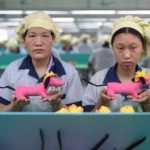 It’s easy to believe that no one really likes living and working in a polluted environment, but the scale of that impact on our productivity was underlined by a recent study published by the National University of Singapore (NUS).
It’s easy to believe that no one really likes living and working in a polluted environment, but the scale of that impact on our productivity was underlined by a recent study published by the National University of Singapore (NUS).
The researchers gathered data from a number of textile mills across China where workers were usually paid for each piece of fabric they made, thus providing a relatively easy and comparable metric for productivity. The team then compared this with the concentration of particulate matter that each worker was exposed to over a period of time.
The standard metric for air pollution is to measure the number of fine particles in the air. It’s an unfortunate fact of modern life that most people living in urban environments are exposed to particle concentrations that are regarded as harmful to our health. In the factories studied however, pollution levels varied considerably from day to day, but they were consistently very high. Indeed, at one location, they averaged seven times more particulates than the recommended level.
Harmful to production
Interestingly, the team did not observe an immediate impact of poor air quality on the productivity of workers, but there was a clear long-term trend observed where output dropped considerably.
“We found that an increase in PM2.5, by 10 micrograms per cubic metre sustained over 25 days, reduces daily output by 1 per cent, harming firms and workers,” they explain. “The effects are subtle but highly significant.”
They remain largely open minded about quite why this might be the case, as air pollution can affect our wellbeing in a wide range of ways, including making us psychologically less motivated.
They believe however that their work is important, not least because their study is one of the first to try and draw a connection between pollution and productivity. Previous works have shown that walking to work through a park leads to higher levels of productivity and employee engagement than a similar walk through a built up environment, so it does appear the case that our environment does impact our productivity in ways that policy makers and managers perhaps take for granted.
“Labourers in China can be working under far worse daily conditions while maintaining levels of productivity that look comparable to clean air days. If the effect were this pronounced and this immediate, we think that factory and office managers would take more notice of pollution than transpired in our field interviews. Therefore, our finding that pollution has a subtle influence on productivity seems realistic,” the researchers say.
The data used in the study has been made openly available, so the team hope that other researchers will take their work and build on it. Hopefully in time, we will gain a much richer understanding of the impact air quality has on our work. For the time being however, it’s perhaps something for managers to think about.